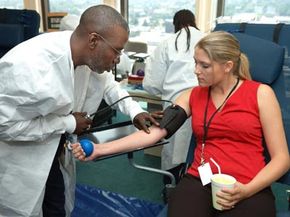Before life-saving (or erection-inducing) drugs reach the public marketplace, they must go through a lengthy and rigorous series of tests to ensure the drug in question is safe and effective. A progression of clinical trials is the most important step in getting a drug into the hands of those who need it, because the clinical trial is where the drug is tested on willing human lab rats.
Universities, hospitals, governments and (primarily) pharmaceutical companies use hundreds of research facilities all over the world to test thousands of promising new drugs on live subjects. Some of these drugs clear up acne, while others deliver a cure for cancer. The volunteers may get involved out of a sense of altruism, out of a need to gain access to otherwise-unavailable new treatments or simply out of a desire to earn some money.
Advertisement
While clinical trials can benefit volunteers physically, spiritually or financially, the rewards are certainly earned. Volunteers often sacrifice the freedom to eat, sleep, drink and behave as they normally would, since drug studies require strict controls in order to obtain the most accurate results possible. Subjects work closely with the research team to help the researchers realize their predetermined goals for the study. Lots of money is put into these trials, and the safety of millions of people will ultimately depend on the validity of the testing phases. Depending on the type of trial and the drug involved, subjects may spend a relaxing few days playing video games when not having their vital signs checked, or they may have a tube placed down their throats and be required to produce regular fecal samples for researchers.
Human guinea pigs put themselves at risk of bodily harm, permanent damage to health and even death. However, some volunteers have made something of a career out of participating in clinical trials, participating in one trial while scouting out opportunities to participate in the next trial, maybe with a nice long break scheduled in between.
Clinical trials are held all over the world, so if you want to take a paid global tour of what often look like intensive-care units, becoming a professional guinea pig may be just the right thing for you. But for most people, volunteering in clinical trials is a unique way to transform a little free time into positive cash flow.
So how do you volunteer for a trial? We'll discuss that in a moment, but first we'll take a closer look at the clinical trials themselves.
Advertisement



